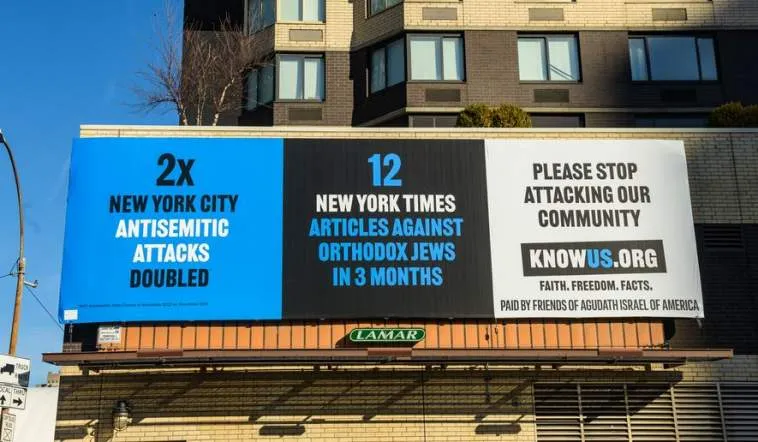(Washington Times) The New York Times came under fire Tuesday from an Orthodox Jewish group over a series of stories they said presented “misleading and one-sided portrayals” of their community.
Avroham Weinstock, chief of staff at the nonprofit Agudath Israel of America group, said the paper had published “entirely one-sided” articles critical of Orthodox Jewish and Hasidic parochial schools known as yeshivas, which instruct students in the Torah and rabbinic commentary known as the Talmud along with standard subjects.
The group aired its grievances on a series of billboards in New York City.
The billboards — one near the Lincoln Tunnel, another in Times Square, and on a building next to the paper’s Eighth Avenue skyscraper — ask the paper to “please stop attacking our community.”
Mr. Weinstock said the offensive depictions of the Orthodox Jewish community were made in a dozen articles the paper has published since September 2022.
The articles, including an 8,000-word investigative feature published on Sept. 11, 2022, in both English and Yiddish, said the yeshivas do not provide enough secular studies to prepare students for life and called them “failing public schools” funded in part by taxpayer dollars.
New York State’s Board of Regents in September adopted regulations requiring parochial schools to get approval for their secular curriculums, and the yeshivas among others have sued to block the new rules.
“The New York Times has dedicated a tremendous amount of resources — investigative journalism is expensive, Mr. Weinstock said in a telephone interview. “They’ve written now 13 articles, dedicated only to smearing Orthodox Jews. Their coverage has been entirely one-sided; they only will interview people who have left the [Orthodox] community.”
Agudath Israel contends the overwhelming majority of antisemitic attacks against Jews — 45 in November 2022, which New York Police Department statistics say is more than double the November 2021 figure — are committed against Orthodox and ultra-Orthodox Jews, the latter group commonly known as Hasidim.






